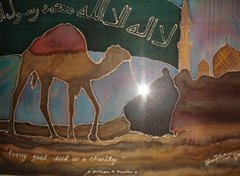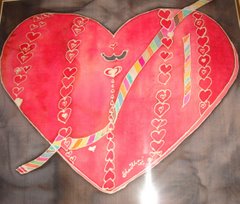
POS-7
THE TORMENT AND THE PLEASURE OF THE GRAVE
It has already been mentioned that the soul is returned to the body in the grave at the time of questioning. [See the trial of the grave] The fact that the soul returns to the body for questioning at this time proves that the torment is experienced by both the body and the soul together.
Does the Torment in the Al-Barzakh affect the soul, the body or both?
The view of Ahl as-Sunnah wal-Jamaa’ah is that the soul is that the soul is distinct from the body but is connected to it. Shaykh al-Islam Ibn Taymiyah said: “The torment and the blessings happen to both the soul and the body, according to the consensus of Ahl as-Sunnah wal-Jamaa’ah. The soul is blessed or tormented separately from the body and is tormented in connection with the body, and the body is connected to it. So the blessings and torment happen to them both together in this situation, and it happens to the soul separately from the body.”
The Terrors of the Grave
Haani’, the freed slave of ‘Uthman ibn ‘Affaan, narrated that whenever ‘Uthman (ra) stood over a grave he would weep until his beard would be wet. It was said to him, “You remember Paradise and Hell and you do not weep, but when you remember the grave you weep?” He said, “I heard the Messenger of Allah (saw)say,
‘The grave is the first stage of the Hereafter. Whoever passes through it safely, whatever comes after that will be easier for him, but if he does not pass through it safely, whatever comes after that will be harder for him.’” He said, “And I heard the Messenger of Allah (saw) say, ‘I have never seen any disturbing scene, more terrifying than the grave.’” (Tirmidhi)
The Squeezing of the Grave
When the deceased is placed in his grave, he is squeezed in a manner from which no one, great or small, righteous or immoral can escape.
It is reported from Ibn ‘Umar that the Messenger of Allah (saw) said, “There is squeezing in the grave; if anyone were to have been saved from it, it would have been Sa’id ibn Mu’aadh.” (Saheeh al-Jaami 2/236)
Narrated from Ibn ‘Abbas (ra) that the Messenger of Allah (saw) said, “If anyone were to have been saved from the squeezing of the grave, it would have been Sa’id ibn Mu’aadh. He was squeezed once and then released.” (Saheeh al-Jaami 5/71)
Squeezing of the grave – both the body and soul experiences it
In the case of the disbeliever, the grave closes in on the body, squeezing the rib cage so tightly that it cracks and the ribs of the right side enter between those on the left.
“Know that the torment of the grave is the torment of Al-Barzakh. Everyone who dies and deserves punishment will receive his share of it, whether he is buried in a grave or not, whether he is eaten by wild animals or burned until he becomes ashes which are blown away by the wind, whether he is crucified, or drowned at sea. His soul and his body will experience the same torment as those who are buried in graves. And he will be made to sit up (to be questioned) and his ribs will interlock (when he is squeezed by the earth), and so on, as was narrated. It is essential to understand what the Messenger (saw) meant, without adding and taking away anything.” (Sharh al-‘Aqeedah at-Tahaawiyyah, p. 451)
According to the hadith of Al-Baraa’ ibn ‘Aazib, the Messenger (saw) said that the angels question the believer in his grave and when he answers well,
“…a voice cries out from the heaven, ‘My slave has spoken the truth; supply him with furnishings from Paradise and clothe him from Paradise, and open for him a gate to Paradise.’ So there comes to him some of its fragrant scent, and his grave is expanded for him as far as the eye can see. There comes to him (according to one report, there appears to him) a man with a handsome face, fine clothes, and a pleasant scent. He says, ‘receive the glad tidings of that which will delight you.’ (Receive the glad tidings of the pleasure of Allah, and Gardens in which is everlasting joy). This is your day which you were promised.’ (The deceased) says, ‘(May Allah bless you), who are you? Your face is a face which portends good.’ He says, ‘I am your righteous deeds. (By Allah, all I ever knew of you was that you were quick to obey Allah and slow to disobey Him; may Allah reward you with good).’ Then a door to Paradise is opened for him, and a door to Hell, and it is said, ‘This would have been your place had you disobeyed Allah, but Allah has replaced it with this for you.’ And when he sees what is in Paradise, he says, ‘O Lord, hasten on the Hour, so that I may return to my family and my wealth.’ (And it is said to him. ‘Be calm and feel at ease.’)”
And the Prophet (saw) said that after the kaafir or evildoer has given a bad reply (to the angels’ questions),
“…a voice cries out from the heaven, saying ‘He has lied. Supply him with furnishings from Hell, and open a door to Hell for him.’ So there comes to him some of its heat and hot wind. His grave compresses him until his ribs interlock. Then there comes to him (according to one report, there appears to him) a man with an ugly face, horrible clothes and a foul stench. He says, ‘Receive the tidings of that which will distress you. This is your day which you were promised.’ (The deceased) says, ‘(May Allah curse you), who are you? Your face portends evil.’ He says, ‘I am your evil deed. (By Allah, all I ever knew of you was that you were slow to obey Allah and quick to disobey Him;) (may Allah requite you with evil.)’ Then Allah appoints over him one who is blind, deaf and dumb, in whose hand is an iron rod which, if he were to strike a mountain with it, it would turn o dust. He strikes him with it until he turns to dust, then he is restored to his former state, and he is struck again. He utters a scream which everything can hear except for mankind and jinn. Then a door to Hell is opened for him, and his grave is furnished from Hell. And he says. ‘O’ Lord, do not let the Hour come.’”
In Sunan al-Tirmidhi it is narrated from Abu Hurayrah (ra) that the Messenger (saw) said that the two angels say to the believing slave, after he has answered their questions correctly:
“We knew that you would say that.” Then his grave is expanded for him, seventy cubits by seventy, and it is illuminated for him. Then it is said to him, ‘Sleep.” He says, “Let me go back to my family and tell them.” They say, “Sleep like the bridegroom who will not be woken by anyone except the dearest of his family to him, until Allah resurrects you from your place of rest.” But they say to the hypocrite, “We knew that you would say this.” Then it is said to the earth, “Squeeze him.” So it squeezes him until his ribs interlock. And he will be tormented until Allah resurrects him from his grave. (at-Tirmidhi hadith no. 1071)
The Prophet (saw) was also shown the torment of various punishments commensurate with their heinous crimes and transgressions.
Narrated Sumurah bin Jundub (ra): Allah’s Messenger (saw) very often used to ask his Companions, “Did anyone of you see a dream?” So, dreams would be narrated to him by those whom Allah willed to relate. One morning the Prophet (saw) said,
“Last night two persons (angels) came to me (in a dream) and woke me up and said to me, ‘Proceed!
I set out with them and we came across a man lying down, and behold, another man was standing over his head, holding a big rock. Behold, he was throwing the rock at the man’s head, smashing it. The rock rolled away and the thrower followed it and took it back. By the time he reached the man, his head returned to its normal state. The thrower then did the same as he had done before. I said to my two companions, ‘Subhan Allah! Who are these two persons?’ They said, ‘Proceed! Proceed!’
So we proceeded and came to a man lying in a prone position, and another man standing over his head with an iron hook, and behold, he would put the hook in one side of the man’s mouth and tear off that side of his face to the back (of the neck), and similarly ear his nose from front to back, and his eye from front to back. Then he turned to the other (second) side when the first side returned to its normal state. Then he returned to it to repeat what he had done before. I said to my two companions. ‘Subhan Allah! Who are these two persons?’ They said to me, ‘Proceed! Proceed!’
So we proceeded and came across something like a Tannur (a kind of baking oven, a pit usually clay-lined for baking bread).” I think the Prophet (saw) added, “We looked into it and found naked men and women, and behold, a flame of fire was reaching to them from underneath, and when it reached them, they cried loudly. I asked them, ‘Who are these?’ They said to me, ‘Proceed! Proceed!’
And so we proceeded and came across a river.” I think he said, “– red like blood.” The Prophet (saw) added, “And behold, in the river there was a man swimming, and on the bank there was a man who had collected many stones. Behold, while the other man was swimming, he went near him. The former opened his mouth and the latter (on the back) threw a stone into his mouth whereupon he went swimming again. Then again he (the former) returned to him (the latter), and every time the former returned, he opened his mouth, and the latter threw a stone into his mouth, (and so on) the performance was repeated, I asked my two companions, ‘Who are these two persons?’ They replied, ‘Proceed! Proceed!’
And we proceeded till we came to a man with a repulsive appearance, the most repulsive appearance you ever saw a man having! Beside him there was a fire, and he was kindling it and running around it. I asked my companions, ‘Who was this (man)?’ They said to me ‘Proceed! Proceed!’
So we proceeded till we reached a garden of deep green dense vegetation, having all sorts of spring colors. In the midst of the garden there was a very tall man, and I could hardly see his head because of his great height, and around him there were children in such a large number as I have never seen. I said to my companions, ‘Who is this?’ They replied, Proceed! Proceed!’
So we proceeded till we came to a majestic huge garden, greater and better than I have ever seen! My two companions said to me, ‘Ascend up’ and I ascended up.” The Prophet (saw) added, “So we ascended till we reached a city built of gold and silver









